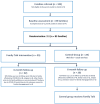Family Talk versus usual services in improving child and family psychosocial functioning in families with parental mental illness: a randomised controlled trial and cost analysis
- PMID: 38606410
- PMCID: PMC11007704
- DOI: 10.3389/fpsyt.2024.1287378
Family Talk versus usual services in improving child and family psychosocial functioning in families with parental mental illness: a randomised controlled trial and cost analysis
Abstract
Background: Parental mental illness (PMI) is common and places children at high risk of developing psychological disorders. Family Talk (FT) is a well-known, whole-family, 7-session intervention designed to reduce the risk of transgenerational psychopathology. However, very few larger-scale evaluations of FT (across only a limited number of settings) have been conducted to date while there have been no cost analyses. This study aimed to assess the effectiveness and costs of delivering FT in improving child and family psychosocial functioning in families with PMI within routine mental health settings.
Methods: A total of 83 families with PMI, with children aged 5-18 years, were randomly assigned on a 2:1 ratio to receive either the FT intervention (n=55 families) or usual services (n=28 families) across 10 adult, child and primary care mental health sites in Ireland. Parental disorders included anxiety/depression (57%), Bipolar Disorder (20%), Borderline Personality Disorder (12%), Post-Traumatic Stress Disorder (8%) and psychosis (2%). Detailed assessments with parents were conducted at baseline and 6-month follow up.
Results: FT led to significant improvements in family functioning and child behaviour at 6-month follow up when compared to usual services, with medium effect sizes indicated. Parent participants with lower mental health literacy at baseline also showed significant post-intervention improvements. Those parents with less severe mental illness at baseline, and families with more partner and economic supports, reported additional significant post-intervention improvements in child depression/anxiety and parental mental health symptoms. The cost of FT amounted to €761.50 per family, although this decreased to €415.31 when recurring costs only were included.
Conclusion: The findings from this study, which was conducted within the context of a national programme to introduce family-focused practice in Ireland, demonstrate that FT is a low-cost intervention that improved child and family psychosocial functioning across different mental health disorders within routine adult, child and primary care mental health services. The findings contribute to the growing evidence base for FT, and provide a robust basis to inform practice and policy development for families with parental mental illness both in Ireland and elsewhere.
Clinical trial registration: https://www.isrctn.com/ISRCTN13365858, identifier ISRCTN13365858.
Keywords: COPMI; Family Talk; children; family-focused practice; mental disorder; mental health; parents; randomised controlled trial.
Copyright © 2024 Furlong, McGuinness, Mulligan, McGarr and McGilloway.
Conflict of interest statement
The authors declare that the research was conducted in the absence of any commercial or financial relationships that could be construed as a potential conflict of interest.
Figures





Similar articles
-
Family Talk versus usual services in improving child and family psychosocial functioning in families with parental mental illness (PRIMERA-Promoting Research and Innovation in Mental hEalth seRvices for fAmilies and children): study protocol for a randomised controlled trial.Trials. 2021 Apr 1;22(1):243. doi: 10.1186/s13063-021-05199-4. Trials. 2021. PMID: 33794971 Free PMC article.
-
The Family Talk Programme in Ireland: A Qualitative Analysis of the Experiences of Families With Parental Mental Illness.Front Psychiatry. 2021 Nov 15;12:783189. doi: 10.3389/fpsyt.2021.783189. eCollection 2021. Front Psychiatry. 2021. PMID: 34867563 Free PMC article.
-
A video-feedback parenting intervention to prevent enduring behaviour problems in at-risk children aged 12-36 months: the Healthy Start, Happy Start RCT.Health Technol Assess. 2021 May;25(29):1-84. doi: 10.3310/hta25290. Health Technol Assess. 2021. PMID: 34018919 Free PMC article. Clinical Trial.
-
Behavioural modification interventions for medically unexplained symptoms in primary care: systematic reviews and economic evaluation.Health Technol Assess. 2020 Sep;24(46):1-490. doi: 10.3310/hta24460. Health Technol Assess. 2020. PMID: 32975190 Free PMC article.
-
Interventions for adults with a history of complex traumatic events: the INCiTE mixed-methods systematic review.Health Technol Assess. 2020 Sep;24(43):1-312. doi: 10.3310/hta24430. Health Technol Assess. 2020. PMID: 32924926 Free PMC article.
Cited by
-
Experiences of patients talking about mental illness with their children: a qualitative study.Front Psychol. 2025 Jan 22;15:1504130. doi: 10.3389/fpsyg.2024.1504130. eCollection 2024. Front Psychol. 2025. PMID: 39911188 Free PMC article.
-
Voices of Children with Cancer and Their Siblings in the Family Talk Intervention.Children (Basel). 2025 Feb 21;12(3):266. doi: 10.3390/children12030266. Children (Basel). 2025. PMID: 40150549 Free PMC article.
References
-
- Maybery D, Reupert A, Patrick K. Prevalence of children whose parents have a mental illness. Psychiatr Bull. (2009) 33:22–6. doi: 10.1192/pb.bp.107.018861 - DOI
-
- Hosman CMM, van Doesum KMT, van Santvoort F. Prevention of emotional problems and psychiatric risks in children of parents with a mental illness in the Netherlands: I. The scientific basis to a comprehensive approach. Aust e-J Adv Ment Health. (2009) 8:250–63. doi: 10.5172/jamh.8.3.264 - DOI
-
- Waldmann T, Stiawa M, Dinc Ü, Saglam G, Busmann M, Daubmann A, et al. . Costs of health and social services use in children of parents with mental illness. Child Adolesc Psychiat Ment Health. (2021) 15:10. doi: 10.1186/s13034-021-00360-yhttps://capmh.biomedcentral.com/articles/10.1186/s13034-021-00360-y - DOI - PMC - PubMed
-
- Mulligan C, Furlong M, McGilloway S. Promoting and implementing family-focused interventions for families with parental mental illness: scoping and installation. Adv Ment Health. (2020) 18:202–16. doi: 10.1080/18387357.2019.1614466 - DOI
LinkOut - more resources
Full Text Sources

